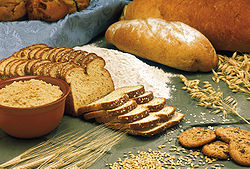Cereals, pulses and oilseeds
Cereals, grains, or cereal grains are grasses (members of the monocot families Poaceae or Gramineae) cultivated for the edible components of their fruit seeds (botanically, a type of fruit called a caryopsis): the endosperm, germ, and bran. Cereal grains are grown in greater quantities and provide more food energy worldwide than any other type of crop; they are therefore staple crops. Grain is both a fruit and a vegetable.

Oats, barley, and some food products made from cereal grains.
.A pulse ( Legume ) (Latin "puls", from Greek "πόλτος" - poltos, "porridge") is an annual leguminous crop yielding from one to twelve seeds of variable size, shape, and color within a pod. Pulses are used for food and animal feed. The term "pulse", as used by the Food and Agricultural Organization (FAO), is reserved for crops harvested solely for the dry seed. This excludes green beans and green peas, which are considered vegetable crops. Also excluded are crops that are mainly grown for oil extraction (oilseeds like soybeans and peanuts), and crops which are used exclusively for sowing (clovers, alfalfa). However, in common use these distinctions are not clearly made, and many of the varieties so classified and given below are also used as vegetables, with their beans in pods while young cooked in whole cuisines and sold for the purpose; for example black eyed beans, lima beans and Toor or pigeon peas are thus eaten as fresh green beans cooked as part of a meal. Pulses are important food crops due to their high protein and essential amino acid content. Like many leguminous crops, pulses play a key role in crop rotation due to their ability to fix nitrogen.
Just like words as "bean" and "lentil", the word "pulse" may also refer to just the seed, rather than the entire plant.
.Vegetable fats and oils are lipid materials derived from plants. Physically, oils are liquid at room temperature, and fats are solid. Chemically, both fats and oils are composed of triglycerides, as contrasted with waxes which lack glycerin in their structure. Although many different parts of plants may yield oil, in commercial practice, oil is extracted primarily from seeds.
The melting temperature distinction between oils and fats is imprecise, since definitions of room temperature vary, and typically natural oils have a melting range instead of a single melting point since natural oils are not chemically homogenous. Although thought of as esters of glycerin and a varying blend of fatty acids, fats and oils also typically contain free fatty acids, mono- and di- glycerides, and unsaponifiable lipids.
Vegetable fats and oils may or may not be edible. Examples of inedible vegetable fats and oils include processed linseed oil, tung oil, and castor oil used in lubricants, paints, cosmetics, pharmaceuticals, and other industrial purposes.
Industrial uses
Vegetable oils are used as an ingredient or component in many manufactured products.
oils is that all such oils eventually chemically decompose turning rancid. Oils that are more stable, such as Ben oil or mineral oil, are preferred for some industrial uses.
Vegetable-based oils, like castor oil, have been used as medicine and as lubricants for a long time. Castor oil has numerous industrial uses, primarily due to the presence of hydroxyl groups on the fatty acid chains. Castor oil, and other vegetable oils which have been chemically modified to contain hydroxyl groups, are becoming increasingly important in the production of polyurethane plastic for many applications. These modified vegetable oils are known as natural oil polyols.
Fuel
Main article: Vegetable oil used as fuel
Vegetable oils are also used to make biodiesel, which can be used like conventional diesel. Some vegetable oil blends are used in unmodified vehicles but straight vegetable oil, also known as pure plant oil, needs specially prepared vehicles which have a method of heating the oil to reduce its viscosity. The vegetable oil economy is growing and the availability of biodiesel around the world is increasing.
From Wikipedia, the free encyclopedia :
Cereals, pulses and oilseeds



